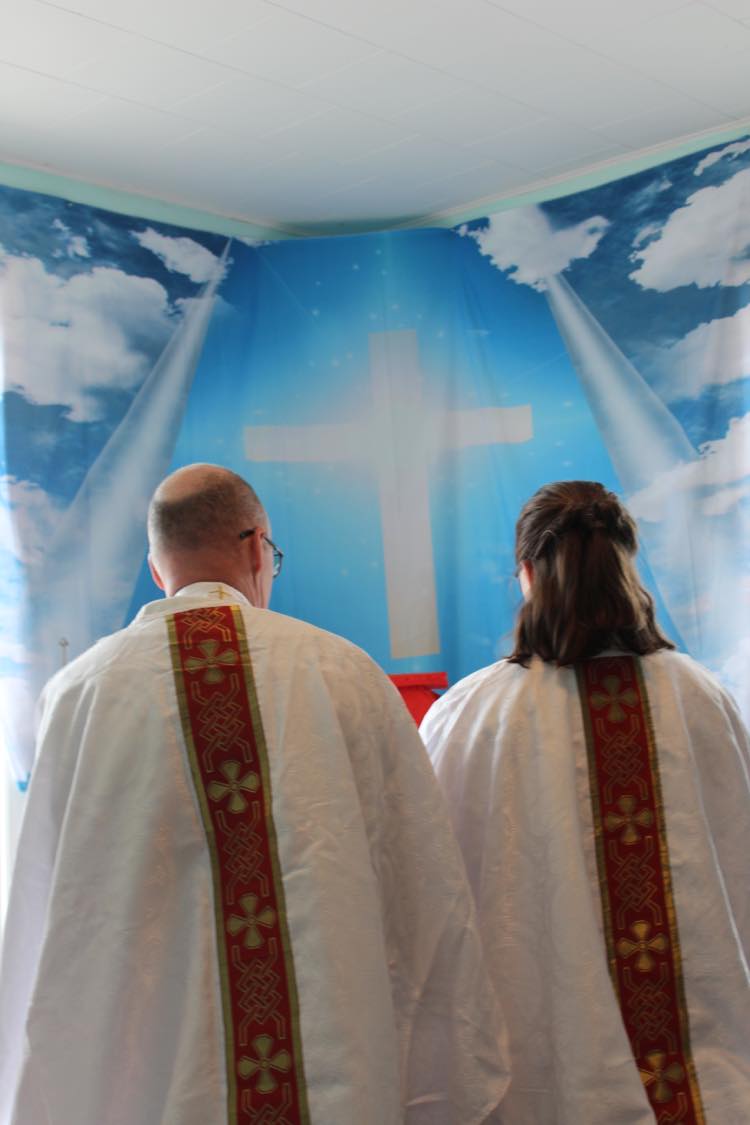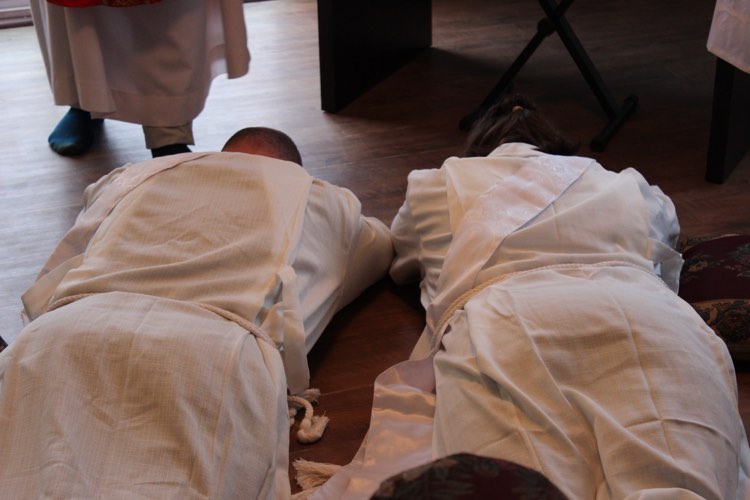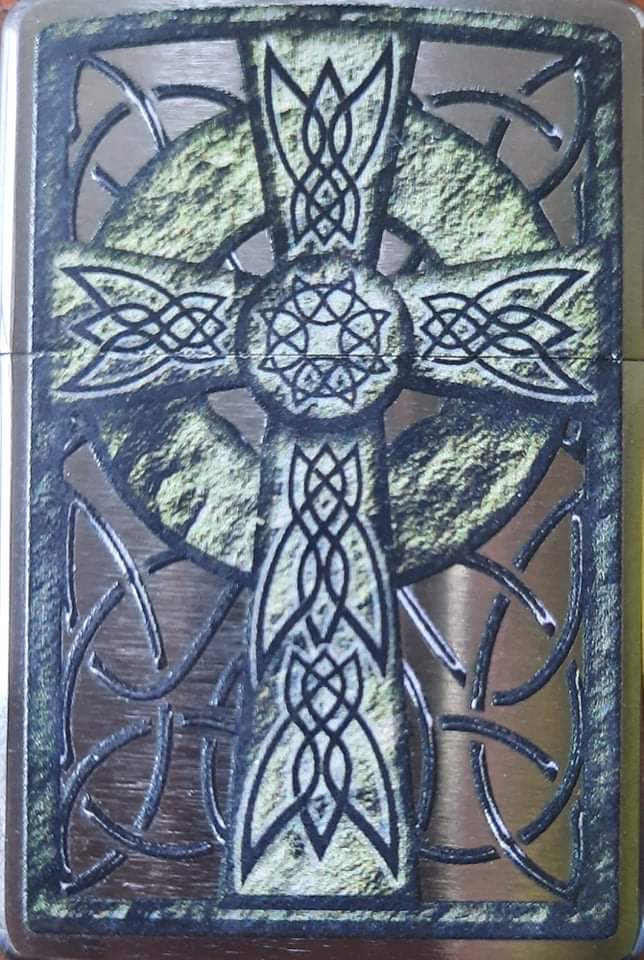- Home
- simply catholic
- Catholic Sacraments
- Confession
Simply Catholic and Welcoming You
Catholic Confession the Sacrament of Reconciliation

Confession is one of the powerful ways that God stresses that He loves each of us for our relationship to Him as children of God far above what we do or fail to do. The Confessional Seal is absolute.
The Sacrament of Reconciliation, more commonly called Catholic Confession, is a place of victory over sin, a return to Jesus and to Grace or personal holiness. For clarity let’s start by defining the co-participants in this sacrament.
When speaking of sacraments we often speak of the visible and invisible parts of each sacrament. Confession depends on Grace, the Holy Spirit and the love of and for Jesus Christ and our Heavenly Father as well as the power and authority of Absolution. These are the invisible parts of the sacrament of reconciliation.
Visibly there are two co-participants, The Confessor and The Penitent. I have heard people wrongly refer to the person confessing their sins as the confessor, so let’s clear up these titles by defining them.
The Confessor is the priest who hears confessions, gives absolution and offers spiritual guidance.
The Penitent is the person confessing their sins, feeling or showing sorrow and regret for having done wrong. They are repentant. Seeking forgiveness from God and a renewed relationship with God through our Saviour Jesus Christ. They should also have the intent to not repeat their sins. They show a ‘’broken heart and a contrite spirit’’, Psalm 51:17.
As Catholics we are called to live the admonition in Matthew 22:37-39 where
Jesus replied: “Love the Lord your God with all your heart and with all your soul and with all your mind.[a] 38 This is the first and greatest commandment. 39 And the second is like it: ‘Love your neighbor as yourself.”
Thus, when coming to Catholic Confession the first thing we need to ask ourselves is have we loved God as Jesus called us to in that verse? Is God the center of our lives or an afterthought? Have I put anything ahead of God?
Followed by, have I loved my neighbour? Also, most often overlooked, have I loved myself?
The answers to these questions form the basis of an examination of conscience.
Catholic Confession: We need to know what sin is
Essentially we need to identify when we know what God wants versus “I want what I want”. Sin is simply when we do the ‘I want’ in direct opposition to what we know ‘God wants’. Sometimes sin can be simply not doing what we know we should.
So we have sins of commission where we do something we knew we shouldn’t. We also have sins of omission, where we fail to do what we know we should.
‘Venial sins’ and ‘Mortal sins’
There are also ‘Venial sins’ and ‘Mortal sins’. Venial sins are ‘lesser’ sins. Not doing what God wants or doing what we know He doesn't want but involving minor, less important matters. Things like the little ‘fibs’ people tell so as not to hurt someone's feelings or to make ourselves look or feel better. Such sins do not need to be confessed and are forgiven by a simple prayer of contrition.
Venial or lesser sins are also forgiven by an act of contrition and receiving the Holy Eucharist, itself, together with the Holy Mass. Indeed Mass includes a general absolution for this very purpose, ensuring that no-one receives the Eucharist ‘unworthily’. (Receiving the Eucharist “unworthily” would itself be yet another sin.)
A sin is only a Mortal sin when:
- It involves a ‘grave’ or serious matter
- The sinner has full knowledge that this is a sin
- The sinner acts or fails to act when required to do so, with complete consent
Clearly then mortal sins are not something a person can truly deny committing, though embarrassment or shame may cause them to do so.
I speak of the confessor/priest and penitent/repentant sinner as co-participants in the sacrament of confession with God as the invisible and most important participant. Each has their own critical functions in being present. The priest is literally there with the authority of God to absolve the sins confessed and any that may be unintentionally forgotten to be mentioned.
That’s right. Many people feel guilty when they later remember a sin they honestly forgot to confess. Not a problem. God didn’t forget. When you make a sincere confession yet forget something (not deliberately leave it out) the God of Love forgives and absolves that sin also.
From God's perspective His child has come to Him filled with sorrow and remorse for whatever is now coming between them and their relationship. He wants nothing more than for His children to know His love and enjoy their relationship with Him.To Him it’s all about the Love and loving relationship. He holds our relationship with Him and our Saviour Jesus Christ above what we do or fail to do.
Catholic Confession is our opportunity to reconcile our relationship with God
Catholic Confession is one of the powerful ways that God stresses that He loves each of us for our relationship to Him as children of God far above what we do or fail to do. He wants and welcomes us to repair that relationship at any time we feel the need. By simple Prayers of Contrition for smaller matters and through Confession and Absolution for serious matters.
Children go to good parents and confess when they mess something up. They feel safe in their relationship with such a parent and trust the parent to help them make right whatever they did or didn’t do. Trusting the parents' love to continue even if both sides were hurt by whatever happened.
God, as the perfect parent, takes this even further. His Love and forgiveness are absolute. He loves each of us for who we are not for what we are or what we do. This Love is the very heart of the sacraments, especially the Sacrament of Confession.
It is about love and rebuilding relationships. It is not about judgement. The priest must do all they can to make this clear to the penitent. A penitent should feel loved and safe, never judged.
Catholic Confession: The Format
What then is the format of the Catholic Confession?
First I will explain it in some detail and then give a brief summary as a take away.
With the penitent and priest together (In an actual confessional or any reasonably private place) Catholic Confession begins with;
Penitent, “Bless me Father for I have sinned.
It’s been (however long) since my last confession.”
The penitent then gives a brief statement of their ‘station’ in life such as “I’m a college student”, or “I’m a single Mom with five kids” or “I’m a married general labourer with 2 kids and working away from home”. Maybe something like “I’m single, living at home and struggling with depression and suicidal ideation”.
This statement of station isn’t a requirement but it serves to remind the penitent and inform the priest, at least in general terms, of the obligations and challenges relative to the penitent's current place in the grand scheme of things.
For example if someone confesses killing “some people” the priest will be very alarmed unless that was prefaced by “I’m in the military.” Context always frames the content and the statement of station also saves the priest from having to stop the penitent by asking questions to gain needed context for what is being confessed.
Likewise a statement about depression and suicidal ideation tells the priest that this person may not be able to handle any spiritual direction that is not carefully framed so as not to be taken as a critique or a put down. They need to be supported and uplifted as and where possible.
In such cases it’s also very helpful if the penitent says “I’m in counselling’ or “going to therapy” since the priest suggesting a person seek therapy or even asking if they are going to therapy can be taken as a put down and go sideways fast.
Actual Confession of Sins
Now the penitent confesses their sins. Confession is meant for confessing mortal sins, not venial sins. There is some latitude in this as young persons rarely have mortal sins to confess so, for them, coming to confession is more about practising and getting comfortable with the process as they grow in age and maturity both in general and spiritually.
Some adults will confess venial sins most often because this is a habit they are really struggling with and it bothers them. In these cases reassurance and spiritual direction are in order.
When confessing mortal sins specifics are needed. Not graphic details but actually naming the sin and the number of times this occurred.
Often I hear “I struggle with sins of chastity” and the penitent attempts to move on to something else. Wait! Stop! That is so vague as to be misleading. Does this person struggle with pornography, are they having an affair with someone else's spouse, or both? Was this a one time occurrence or a daily event?
The priest is forced to interrupt and ask questions to narrow the field and determine how serious the issue is and possible ways to help at least with spiritual direction. So, please be specific but not graphic.
Penitents Courage
In the confessional what stands out to a priest isn’t the sins. It is the courage of the penitent to be honest and vulnerable in their confession in order to reconcile their relationship with God and Jesus. For a priest this is the heart of our calling, to bring people back to Jesus so the catholic confessional is a critical, beautiful sacrament to achieve that very goal.
Signal the conclusion
Having confessed their sins the penitent lets the priest know that they are finished by stating “These are my sins and for them I am truly sorry”.
When a penitent is silent without indicating that they are finished, I am always reluctant to interrupt in case they are thinking or wrestling with something else. This is sacred space. Interruptions can break a train of thought or allow embarrassment to cause the penitent to withhold something they needed to share. At a minimum they can cause the penitent to feel the priest is rushing them or minimising their struggle. So please, avoid awkward silences by letting your priest know when you are done.
The Penance
The priest will then assign a ‘penance’ which is usually some prayers to say on your own after the confession is fully ended. Please note that this was not the only available penance that can be given. For example, theft may indicate restitution. When restitution is not possible a charitable donation or charitable work may be asked as an option.
For sins like adultery the penance may have been that the penitent confesses their sin to those they’ve hurt and work on rebuilding their relationships with true sorrow for what they have done and transparency moving forward.
At one time these types of penance were the norm and binding. Now the prayers for penance are the norm and the rest fall under “requests”, “suggestions” or under the general heading of spiritual direction. People today expect their sins to be kept secret. They don’t expect to be asked to ‘make things right’.
The seal of the confessional is absolute
As priests we are taught that we will go to jail if necessary and still not break this sacred seal of confessions. Demanding or insisting that the penitent confess to those they’ve harmed or make restitution has been seen as forcing the penitent to break that seal. So no, these requests or spiritual directions cannot be binding nor enforced. They haven’t been binding for literal centuries now.
So, some priests may ask or suggest these things and you may choose to take them under consideration as spiritual guidance but they are not binding and absolution can no longer be refused on the grounds that you ‘must’ do these things first.
Point being a priest may suggest these things yet, no matter how valid the suggestion, it remains a suggestion. It is your choice and your choice alone to do or not do any such thing. Confession is between you and God.
The priest is the intermediary whose purpose in the confessional is to help you make a good and complete confession in order to reconcile with God and Jesus and to grant you absolution for the sins you confess (and any you forgot). We are not a court of law with authority and powers to direct your future actions.
I have included this information because this is something a very few priests have been guilty of. This type of self righteous dominance is a form of abuse that only an educated public can call out. Enough said!
Act of Contrition Prayer
So, sins confessed and righteous penance assigned it is now proper for the penitent to say the Act of Contrition prayer, with the priest’s help if needed. (So if it’s been a while and you forget the prayer don’t panic, the priest should help you out.)
I personally prefer another option. I simply ask the penitent if they would be comfortable expressing their sorrow for their sins in their own words. Some of the prayers people come up with when they have that freedom bring me to tears and it’s still their choice. No pressure! I help them say the Act of Contrition or they say their own prayer, their choice.
Absolution
The priest then gives Absolution. The sins of the penitent are gone and they are now as unblemished as a newborn baby before man and God! They are fully in God’s Grace.
Catholic Confession: Common Missteps
I need to talk about some of the missteps that occur in the confessional. I’ve already pointed out that some priests can be guilty of exceeding their authority and breaching their protocols. So this will be more about the penitent missteps.
Stay focused.
Catholic Confession is about reconciliation so it may involve ‘pastoral counselling but it is NOT therapy and there may be others waiting to make their confession.
Catholic Confession should be as long as needed AND as brief as possible.
The priest doesn’t want to keep a person in a vulnerable state any longer than necessary. If longer talks are needed then they are worthy of booking time for them separate and apart from the confessional.
Most priests are more than happy to book time for more lengthy discussions or pastoral counselling in a more relaxed setting. This can still have the confessional seal (if in doubt simply state that you want your conversation under seal). You are simply accepting that more time, possibly more depth is needed than can be appropriately afforded in the confessional.
Booking personal time/Pastoral Counseling
Booking such time is part of pastoral ministry and most priests are delighted to book it. It is also an opportunity for relationship building between the priest and penitent. You can get to know each other better and build lasting relationships of trust.
Likewise people, penitents, come to Confession with the best of intentions and, often with no idea what they are doing. Sometimes this is due to a long absence. Other times the person has been coming to confessions regularly and I can only assume the priest they have been going to didn't take the opportunity to coach them to make a ‘better’ confession.
I say this cautiously a coaching during confessions can go sideways fast. Priests must exercise discretion in this area.
For Confessional Coaching for Priesthood and Laity click here.
Recent Articles
-
Catholic-Confession
Apr 19, 25 08:53 PM
Full breakdown of the Catholic Confession Sacrament of Reconciliation -
Ordination, incardination and dismissal of clergy
Mar 03, 25 06:47 PM
Overview of Ordination to Holy Orders, incardination and dismissal of clergy -
Catholic Last Rites
Mar 03, 25 06:41 PM
An explanation of the Catholic Last Rites and Anointing of the Sick

